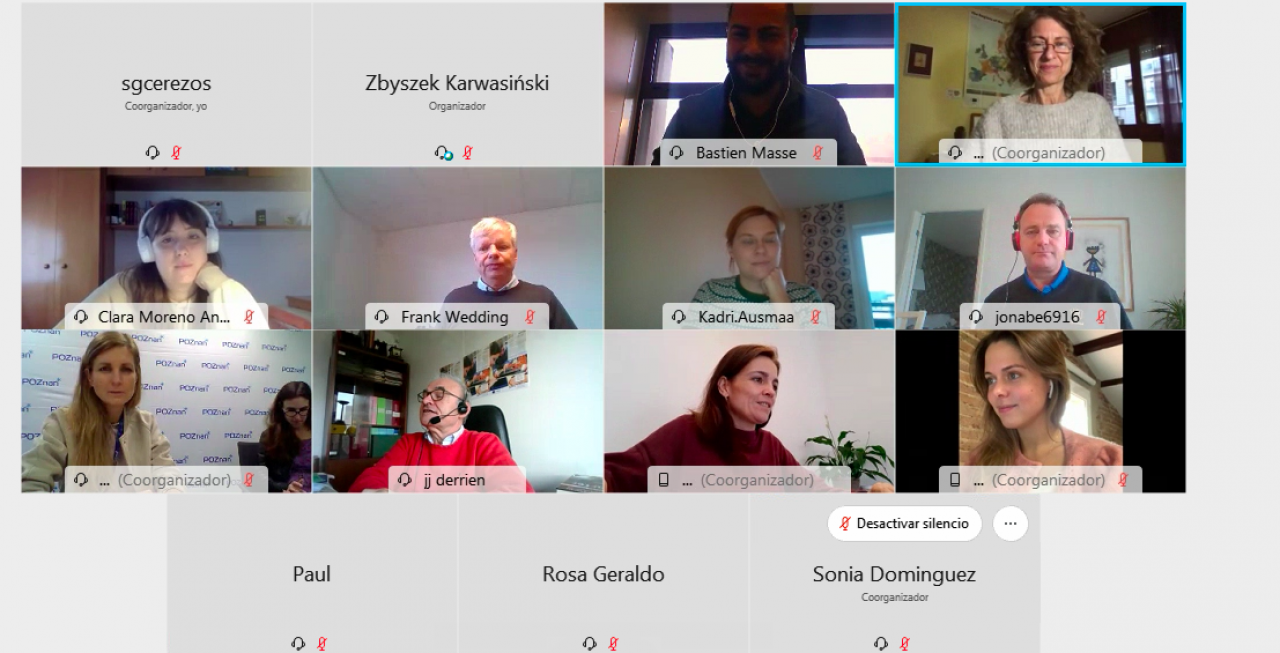
After several months of preparation and dealing with a global situation that has changed many of the plans, the ON BOARDers have gathered. The fifth Transnational Meeting of the ON BOARD project arrives to Poznan. A host city that, this time, has opened its doors virtually.
Objective TM5 focus on the role of 2 key stakeholders for Educational Innovation network: young and families.
The first session of the 3 days meeting was focused on young people.The session embarked upon a few welcoming words from Mireia Sanabria, expert of the ON BOARD project and Iwona Matuszczak-Szulc, coordinator of the ON BOARD project in Poznan.
Participants also had the opportunity to see how Poznan is preparing their new Edication Policy. Prof, Jan Fazlagic. (Poznan University of Economics and Business) presented the Education Policy 2030 in the city of Poznan, The policy, that focuses in 7 priorities:; Climate Education, Educational equity, Meeting Labour Market Needs, School safety, Developing Teacher’s and Principal’s Knowledge and Skills, Institutional Support for Innovation and Facilitating Collaborative Partnerships in Education.
Is being developed:
- With a multi-staged process (2018 – 2021)
- The nvolvement of all stakeholders
- Evidence-based
And is strongly linked to the higher-level documents (EU’s Key Competences, UNESCO, Poznan Strategy for Development 2030).
Young voices joined
Students’ representatives, Urbact Local Group (ULG) coordinators, ON BOARD Project coordinators, teachers and headmasters joined the meeting and became our special guests.
The students were surveyed prior to the meeting using a short survey that collected questions about how they, as students, can contribute to improving the educational experience or participate in the Educational Innovation Network. From these questionnaires, several suggestions, ideas and proposals emerged and Mireia Sanabria, project Lead Expert, analysed and shared them with the rest of the participants.
How can you participate in the Educational Innovation Network?
“Be part of a group whose issues of interest are also mine (music, image…). Students’ Councils do this only partially, but they are too formal entities.
“Allowing us to be more involved and participating to change and design education projects”
Despite not being able to visit the educational projects physically; students and teachers shared ? (per fer-ho impersonal) in their initiatives through the screen.
Each city presented, in video format, Good Practices that were related to students. A total of 12 videos that served as a guide and example for the following dynamics. All partner cities and meeting participants were asked to wath all these videos before the session day.
In TM5, Divided by cities, in parallel sessions, each of the groups had the opportunity to discuss all the Good Practices and develop a Pilot Project inspired by projects of other partner cities. Some decided to adapt one of the projects that had been shared and on the other hand, others decided to create a new one.
A collaborative dynamic in which students from each city shared their feelings and proposals as the main characters for this initiative. These were some first ideas:
- Poznan pointed to adapt PiGo project from Albergaria including more stakeholders in it such as NGOs, Youth City Council and teachers.
- Tallinn intend to transfer the Fund of the Pupils Council to support Student Council activities and to make it more effective.
- Halmstad would like to adopt the Student Council project to give more influence to the students.
- Nantes would like to put the focus on the project “Adventure of feelings and Thoughts from Albergaria starting with an analysis of the engaging process of emotional interaction.
- Albergaria, as other partner cities would like to adapt the Poznan’s project regarding the Students Self-Government Fund implementing a participatory budgeting and having the students associations involved.
- Viladecans suggested to implement a new project called “Good Friends” where students from 4th grade of High School will be “good friends” to students from 1st grade in order to become as mentors and support the younger students.
The role of critical friends was also put into practice and each city analyzed and shared their opinion regarding the project proposal of another partner city.
Would you like to know more about the learnings and conclusions? Find here the TM5 Report with the main conclusions and learnings.
Don't forget to follow us on Twitter: @OnBoardCities in addition to subscribing to our newsletter: https://mailchi.mp/viladecans/on-board
